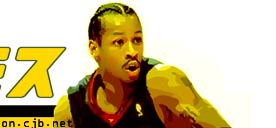





| ANSWERING TO ONE |
|---|
| Ann Iverson remains the pillar in her son Allen's life |
|
ATLANTIC CITY - Ann Iverson was still drowsy from the anesthetic given her when a nurse stopped by her bedside and asked, "Would you like to see your baby?" Without a husband by her side and steeped in poverty, she was just 15 years old, jobless and frightened by the immense responsibility that was being wheeled into her room: a tiny child who had to be fed, cleaned, schooled and loved. Older women with whom she had been acquainted told her to pray for a boy, someone she could count on to help her through the ordeal that surely lay ahead.
She prayed. "What is it - a boy or a girl?" Ann Iverson asked the nurse. "A boy," the nurse replied as she handed Ann her son. "Thank you, Jesus," Ann said joyously. "I remember I was so amazed - this was a real baby," Ann Iverson said 24 years later as she sat in a suite at the Trump Taj Mahal. "Not a baby doll but someone I would have to care for. I remember when I stretched him out on the bed to check him out, his hands came down to his kneecaps. I got so excited. I thought, 'This little boy is going to play ball!' " Whatever hopes Ann Iverson had for her son that long ago day have been far surpassed. Abandoned at age 3 by his biological father, Allen Broughton - currently serving a prison sentence in Connecticut for the stabbing assault of his ex-girlfriend - young Allen climbed out of the squalor of Hampton, Va., to not just "play ball" but to become a superstar. With him every step of the way, Ann Iverson, 39, overcame hardships of her own to guide him as well as she could through the uncertain passages of adolescence. To appreciate how close the bond is between them to this day, Ann said that it is not uncommon for her to speak to Allen three times a day on the cellphone she keeps with her. While the calendar says that Sunday is Mother's Day, Allen Iverson would appear to observe that holiday every day. In the four years that Allen has been cashing checks from the 76ers, Ann Iverson - who keeps close eye on his affairs - has been steeped in the indulgences of a grateful son. That candy-apple red Jaguar she always dreamed of back in Hampton? She got it - along with a house, jewels, clothes and other objects of affection. When the 76ers clinched their first-round playoff series against the Charlotte Hornets, Ann said Allen casually tossed her the keys to his Bentley and said, "Here, ma. This is yours." No one is as close to or has as strong an influence on Allen Iverson as Ann. "It says in the Bible that if you live right, your later days will be your better days," said Ann. "And God has blessed us in our later days." Whenever Ann Iverson shows up in Philadelphia or elsewhere to see the Sixers play, you can usually find her in an aisle seat behind one of the baskets. With a big sign in her possession that proclaims "No. 3 is My No. 1 Son," she leaps to her feet and holds it up whenever her son dazzles the crowd with yet another extraordinary play. Although the fans in Charlotte said that she blocked their view, Ann always enjoys a far better reception at the First Union Center, where she liberally dispenses photos of Allen with her autograph on it. When Allen is not playing especially well, she is even apt to wander over to the bench and anoint his forehead with blessed oil. Seeing his "ma" at courtside always leaves Allen Iverson with a feeling of reassurance. Although he plays with daring ferocity on the court and carries himself with an anti-establishment swagger off it, Allen suddenly becomes a pussycat when it comes to the woman who brought him into the world and raised him. When he looks back on how far they have come in just a few short years - the hard times they had - it amazes Iverson that she was able to hold it together the way she did. Seated at his locker before Game 3 of the Indiana series Wednesday evening, Iverson looked up as he laced his shoes and softly called her his "idol." "She is the person I have always looked up to," said Iverson, who has a tattoo over his heart in honor of his "ma" - Ethel Ann Iverson. "I never had a sports figure as a role model. It was always her. By her always telling me I could do something with my life, I believed it. She used to tell me I could be anything I wanted to be. Some moms in her position would have given up, but she did what it took. I feel I was raised well. I would not have wanted to be raised by anyone else or any place [else]." Even before she found herself with a baby at age 15, life was tough for Ann Iverson, the oldest of four siblings. She grew up in a dangerous part of Hartford, Conn., where she said she was always in street brawls and surrounded by gunfire. When she was 12, her mom became gravely ill and died, at age 30. The autopsy revealed that the procedure she had to have her tubes tied had been done improperly. When Ann was told what happened, she went outside in the rain and shouted at the heavens: "What kind of God are you to do this? How could you do this?" Suddenly, Ann found herself taking care of her two brothers and sister. And then Allen was born. Ann Iverson was only a child when she met Allen Broughton, who had become a fine amateur basketball player in the Hartford area. They had gone to grade school together. Ann remembers that he was a member of a local gang and he had been helpful to her in some of her street altercations. Ann says that she was crazy about him, but that they split apart when she accidentally became pregnant with Allen. She went to Virginia to live with her grandmother. On the June day in 1975 that she delivered Allen, Ann Iverson remembers how long and skinny her boy was, how he gripped her hand to hold on. When he took him back to Connecticut for a visit, it dawned on her that the place she grew up was no place to raise her own child. "I looked around at these people hanging out, the drugs being sold," she said. "I told myself, 'No way am I ever coming back here.' " While Broughton told the Daily News in a 1998 interview that he was eager to reclaim a relationship of some kind with his son, he conceded that he has not seen Allen since age 3 and that he provided Ann with no financial support through the years. He said he withdrew from their lives when Ann left Connecticut and began a relationship with Michael Freeman, who chipped in financially and who in later years was in and out of jail on drug violations. Though Allen Iverson is understandably indifferent toward Broughton (who had tried to contact him while he was Georgetown), Ann is more or less forgiving of him. "I understand the kind of life we were brought up in," she said. "I have never, ever blamed him. And I have told Allen not to. I feel sorry for him. And I loved him. But not only did he never contribute, he never even called to see how Allen was doing. Allen would look at him today like just another guy he would pass on the street." Broughton told the Daily News that he would do it differently if he had to do it over. "My intentions were to move down there, but I was only 15 years old," he said. "Then she got involved with someone and I got involved with someone. We never had a chance to be together. I should have stayed in contact with him." Would he still feel that way if Allen were not a superstar athlete? Broughton said, "I could care less if he were an NBA player." Without any child support from Broughton, Ann Iverson barely scraped by in Virginia. When she was 18, she received $3,818 as part of the settlement from the hospital over the death of her mother, and spent it on what she remembers as a "few pieces of cheap furniture" for her apartment. To support Allen and the two daughters she later had with Freeman, Ann worked through the years at Langley Air Force Base as a secretary, then at New Hampton Inc., driving a forklift, then at the local shipyard as a welder. Evicted from her home twice during those years, Ann remembers a conversation she had with Allen when he was 13 or so, when he was beginning to come into his own as a basketball player. Allen sat on the dresser and said quietly, "Ma, I can't be poor. I just can't be poor." Ann looked him in the eye and replied, "Well, you better get your grades up or you'll be a Burger King flippin' brother." Allen slowly nodded when reminded of that exchange on Wednesday. "Uh-huh," he said. "I remember it like it was yesterday." Surrounded by controversy over a brawl that occurred in a bowling alley (and landed him in jail for a period before he was granted conditional clemency), Allen Iverson cried when he got into the car to go off to college at Georgetown. "It was as if someone poured a bottle of water over his head," said Ann, who helped arrange for Allen to play at Georgetown under John Thompson. She hoped he would be a guiding force in the life of her son and was pleased with the work he did. When Allen dropped out of school after his sophomore year and entered the NBA, Ann said she could not have been happier when he was selected by the Sixers and hooked up with club president Pat Croce. Ann adores Croce. "My friend!" she said. "He is a people person. He can relate to Allen. He lets him be a little boy." Croce has found Ann to be a useful conduit in communicating with Iverson. He speaks with her frequently. "No one is closer to Allen than Ann," said Croce, who said she sent him a bottle of blessed oil when he suffered a severe leg injury last summer. "She knows how he thinks and why he behaves the way he does. . .Allen is not someone you can tell something to; he usually learns from experience - and it can be a painful experience for me. What I will do is ask Ann, 'Ann, will you let Allen know this is why we want him to do this?' Allen loves her." You remember "The Godfather"? Croce calls Ann Iverson "The Godmother." She keeps a careful eye on Allen. She gets a copy of his financial statement each month and said she is always aware of what comes in and goes out. She said she also "keeps an eye on the little boys," which is to say "the crew" that follows Allen around. While Ann said she is glad that Allen has people to protect him, especially from "the really wild fans" he encounters, she added that she has told them that she will not tolerate any slip-ups. When Allen had his $137,000 car impounded in Virginia in 1998 after friends were found in it with drugs, Ann Iverson said she laid down the law. "I let his friends know, 'I love my baby,' " said Ann. "I get on those boys hard. But I love having them around to watch his back. You have no idea what he goes through. Guys are bad enough, but the women! He has to fight them off. I have to speak with Pat Croce. Allen should have a bodyguard with him." Ann Iverson said Allen has grown up a great deal in his four years as a pro, even if he continues to occasionally blow off practices. She is proud of the dad he has been to his two children (Tiaura and Allen II), that because of his upbringing, he dedicated himself to "doing right by them." She said he has become better at handling money, and that overall he has calmed down significantly since he broke into the league. While he still dresses in baggy jeans and T-shirts, Ann foresees a day when he tosses his old clothes in the trash and begins wearing finely tailored suits. She said they have occasionally discussed his choice of apparel. "Ma," Allen has told her. "Why do these people care what I wear? I'm not 40 years old. I'm 24." Grinning, Ann replied, "You sure are. But if you want to wear 'em low, just pull 'em up a little bit." Ann Iverson stepped out on the balcony of her 16th-floor suite at the Trump Taj Mahal and looked out at the Atlantic Ocean, the gentle surf falling on the beach. Three days after the Sixers closed out Charlotte from the playoffs, Ann had come to Atlantic City with her fiance, George Jackson, for what she called a timeout. Jackson, a polite sort who called Ann "the boss" and who carried a pocketful of casino chips, had fallen in love with her years ago when he had been in the Air Force and given her a ring. It somehow ended. They got back together after Ann fell seriously ill with high blood pressure and contacted him. He lived in Texas. Now they both do. "I remember I had to pawn that ring over and over again to pay the bills," said Ann. "He is the man I measure others against." She still remembers what it was like to be poor, the inexpressible longing. Oddly, what comes back to her are fragments from those days: The garbage bags of wash they carted to the laundry; the loaves of Wonder Bread; the powdered milk that she used on her cereal. She remembers standing in line at the Salvation Army for clothes and scraping up enough cash to buy Allen basketball shoes. She could go on and on. And that would only be the beginning |

|
|---|
| Author |
| Kram |
| Source |
| Daily News |
| Return to Articles |